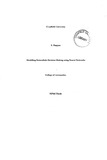JavaScript is disabled for your browser. Some features of this site may not work without it.
| dc.contributor.advisor | Harris, Don | |
| dc.contributor.author | Duggan, S. | |
| dc.date.accessioned | 2023-01-26T13:37:38Z | |
| dc.date.available | 2023-01-26T13:37:38Z | |
| dc.date.issued | 2000-01 | |
| dc.identifier.uri | https://dspace.lib.cranfield.ac.uk/handle/1826/19022 | |
| dc.description.abstract | This thesis describes two studies conducted within a naturalistic decision making paradigm. Study One examines the choice of university for master level education. This decision is presented as a consequential choice decision task. Students, who had been offered placements at Cranfield University for the 1998/99 term, participated in this research. Factors influencing the participant’s decision to attend or not to attend Cranfield were collected with a questionnaire specifically designed for this purpose. The final data set contained 267 questionnaires. Study two describes a decision where a disruptive passenger threatens a hypothetical flight. Sixty-five professional members of flight crew participated in a series of semi-structured telephone interviews during which they described their decision-making process for dealing with this situation. This decision process is presented as a pattern-matching task. Artificial neural networks were used to model the decision on the basis of the input variables (questionnaire items in study one and interview variables in study two) undertaken to produce an empirically verifiable model of the participants decision making process. Cross-validation of the results showed that decision outcomes could be predicted on the basis of the models. The cross-validation results, in terms of classifications are compared with discriminant function analysis classification results, to determine if neural networks or discriminant function analysis is a more appropriate form of analysis for modelling a naturalistic decision. Both studies show that neural networks outperformed the discriminant function analysis results in terms of classification. Press’s Q analyses also support this finding. It is suggested that neural networks may be a viable way of modelling naturalistic decisions. | en_UK |
| dc.language.iso | en | en_UK |
| dc.title | Modelling naturalistic decision making using neural networks | en_UK |
| dc.type | Thesis | en_UK |
| dc.description.coursename | MPhil | en_UK |
